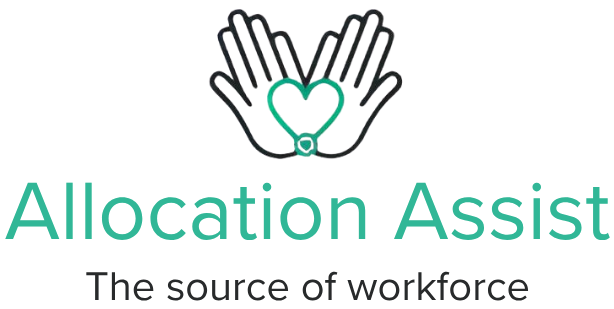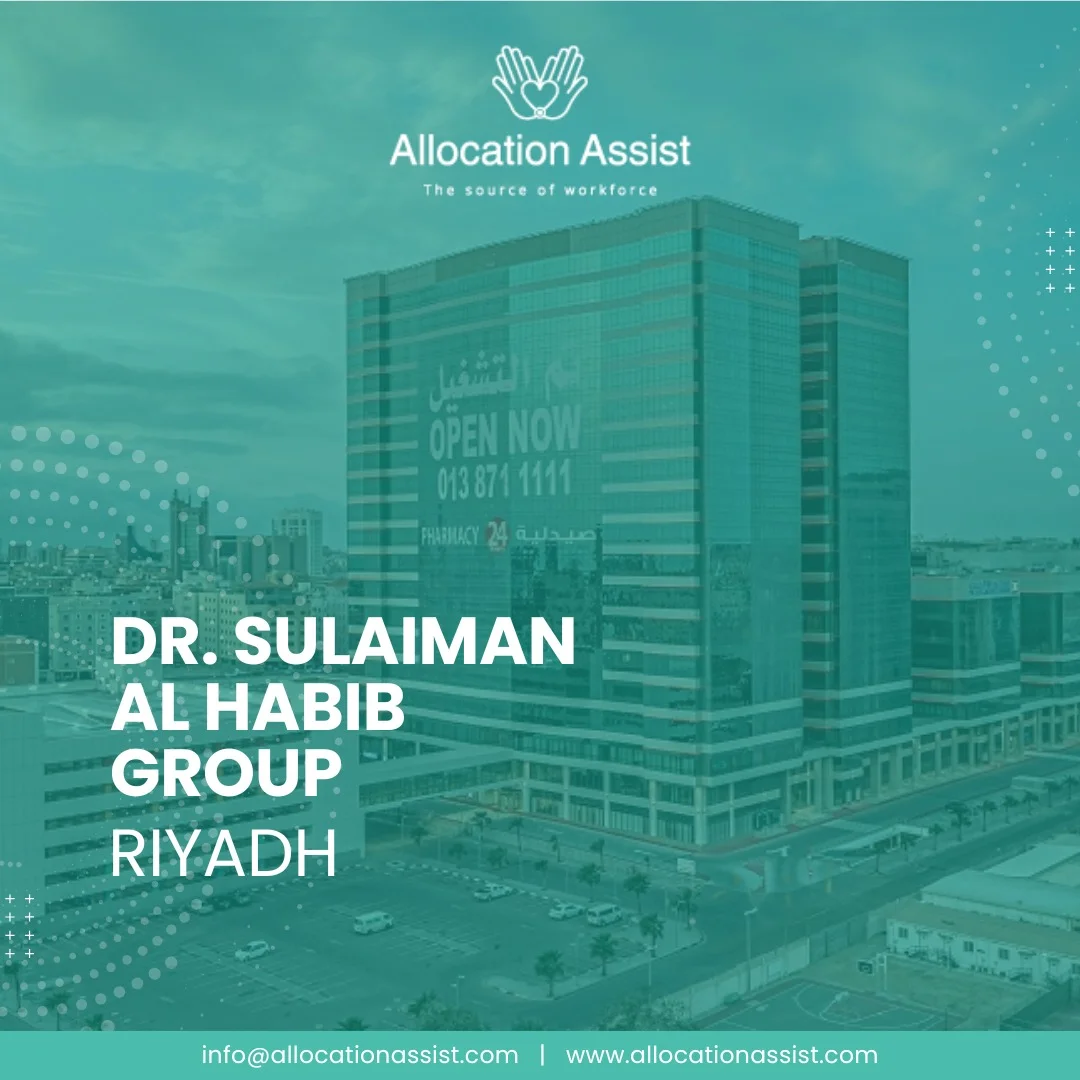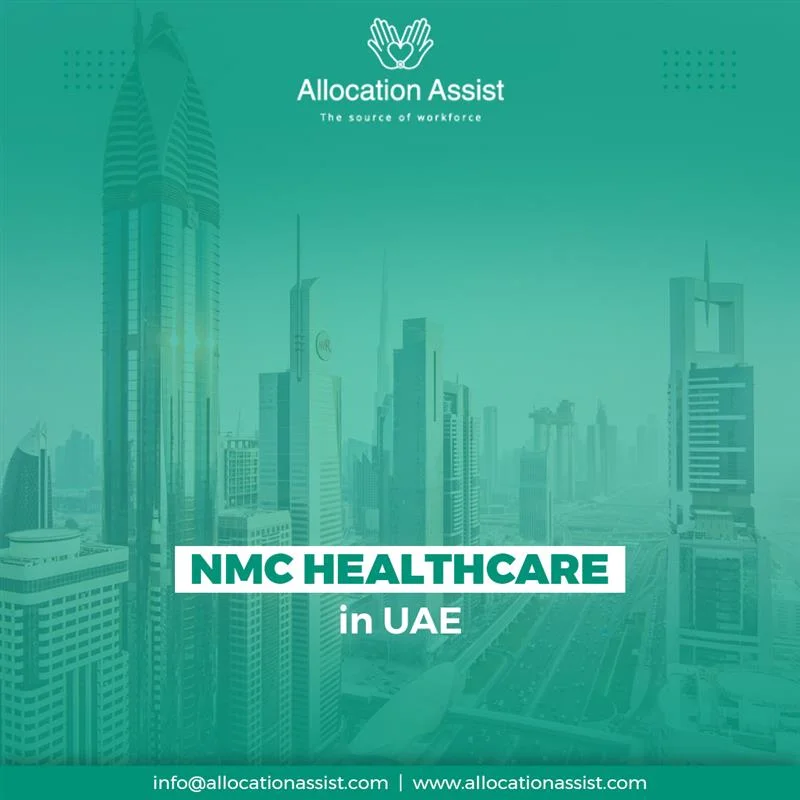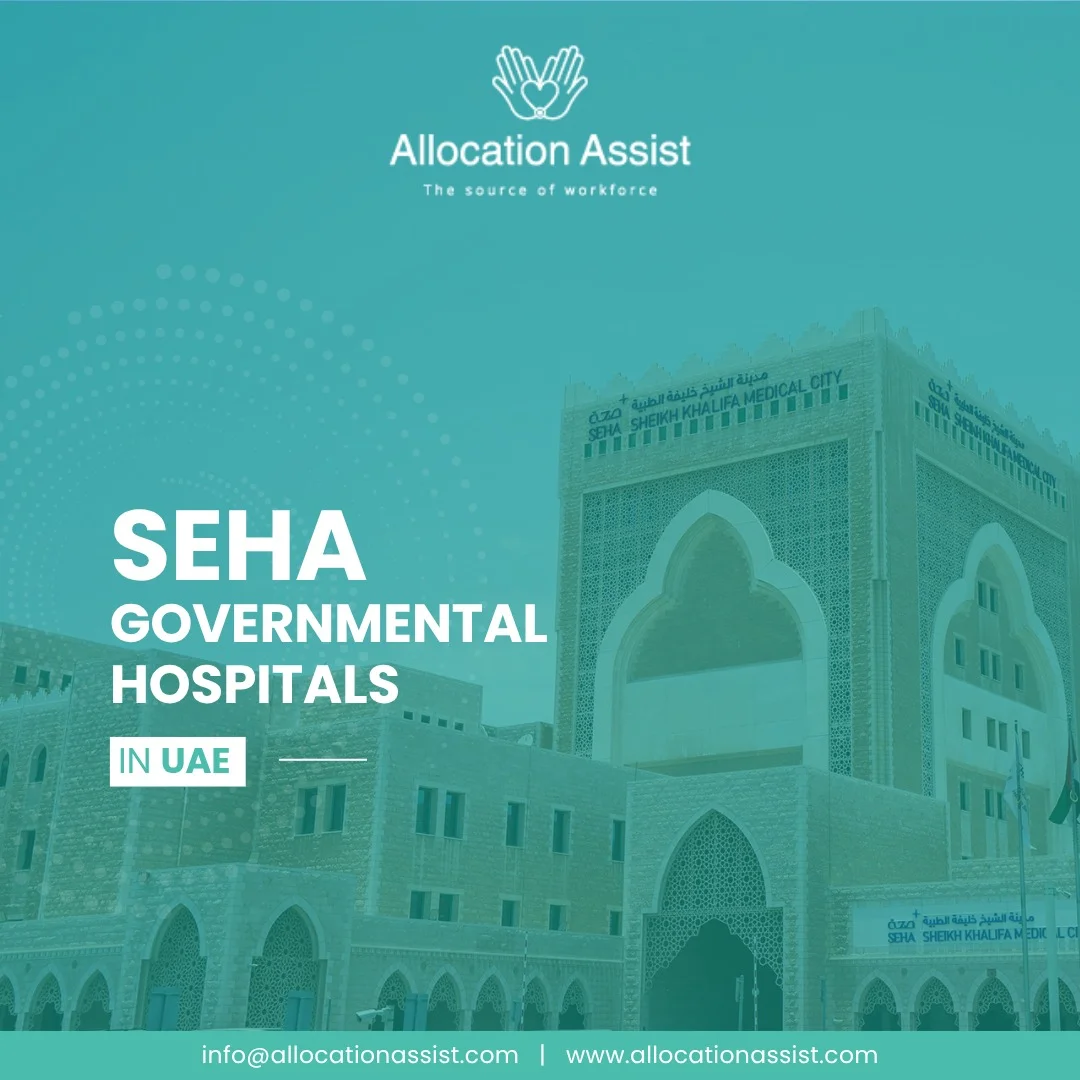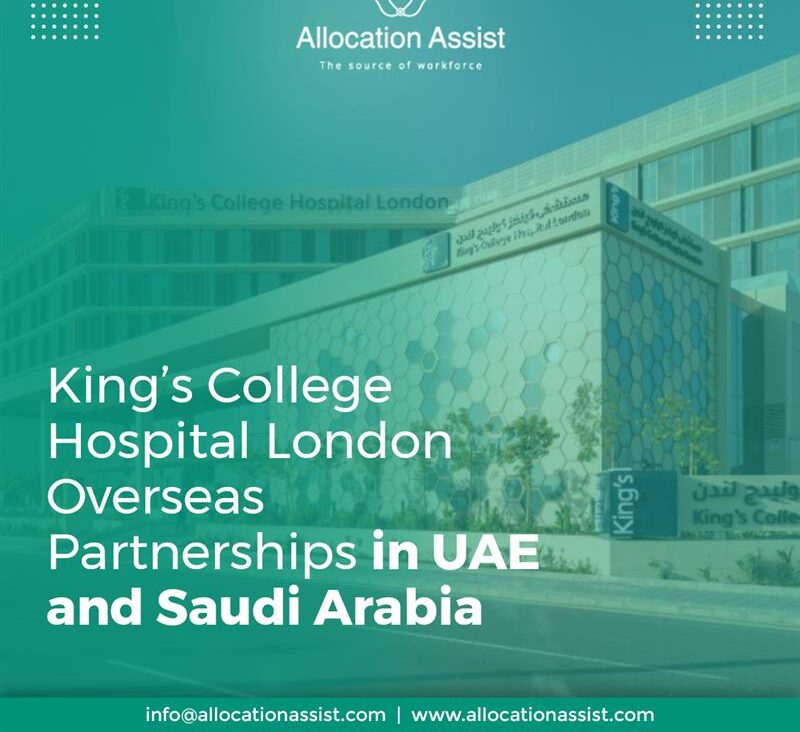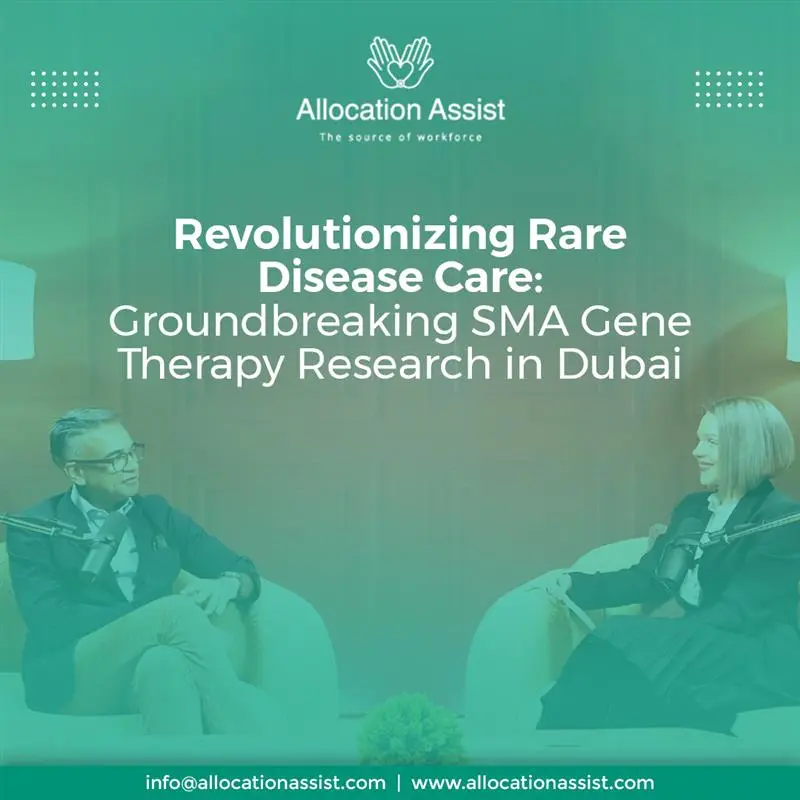The United Arab Emirates is a well-established and expanding healthcare sector that recruits medical professionals from around the world. Doctors are attracted to relocating to the UAE as it offers higher salaries, zero income tax, and an improved quality of life. Here we are going to guide the Ultimate Guide to UAE Medical Licensing for Doctors.
The UAE healthcare recruitment market is dynamic and competitive. Hospitals looking to fill vacancies quickly prefer candidates who have already proved their eligibility to work in the country. Therefore, if you are a doctor considering relocating to work in the UAE, it is highly advisable to start the medical licensing process as early as possible.
The process can seem daunting, but our experienced medical licensing team can help you navigate the process smoothly, saving you both time and stress.
Medical licensing authorities in the UAE
The UAE authorities have developed rigorous systems to verify identity, qualifications, skills, and experience to ensure that healthcare professionals practice safely in accordance with UAE law and international best practices.
There are 3 different authorities who regulate the medical license for professionals within different emirates of the UAE:
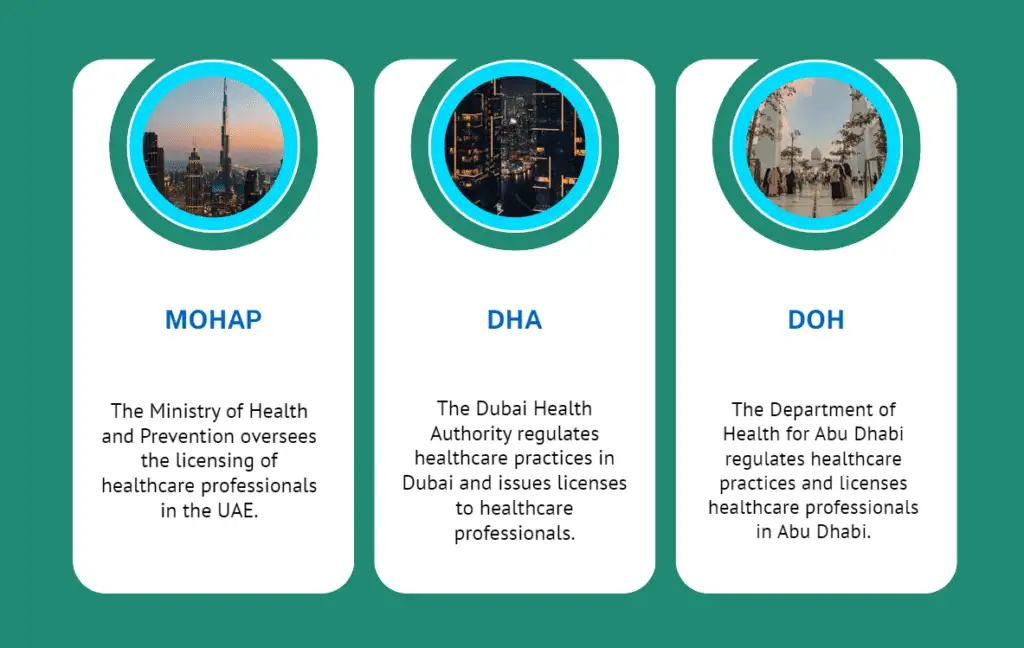
- DOH / HAAD Department of Health for Abu Dhabi
- Dubai Health Authority for Dubai City
- Ministry of Health and Prevention (MOHAP) for all other emirates; Sharjah and Fujairah, Umm Al Quwain, Ras Al Khaimah, and Ajman.
Unified Healthcare Professional Qualification Requirements (PQR)
The Unified Healthcare Professional Qualification Requirements (PQR) document lists the DHA licensing titles and the requirements and specifications for each of those titles. The required post-qualification experience depends on the profession and grade. Candidates must have a valid professional license to practice in their home country or country of last employment. For more information, read the full Dha Guide.
There are 5 Steps in the Medical Licensing Process
1. Create a new application
The process starts with creating an account with a username and password on the relevant medical licensing authority’s platform before initiating the New License process. It is advisable for an applicant to plan which emirate they wish to work in before applying for licensure with the corresponding authority.
Department of Health, Abu Dhabi (DOH)
https://www.tamm.abudhabi/en/life-events/business/healthcare professionals/request registration of new license for a healthcare professional.
Dubai Health Authority (DHA)
Ministry of Health (MOHAP)
https://mohap.gov.ae/en/services/health-professional-evaluation .
Online forms must then be completed with comprehensive personal and professional details.
The Professional Qualification Requirements (PQR) are the same for all UAE licensing authorities. The requirements vary according to the healthcare profession, qualifications, country of training, specialty, and grade.
The DHA has a self-assessment tool that allows applicants to assess whether they meet the Unified Healthcare Professional Qualification Requirements (PQR) before starting the application.
2. Upload your documents
The required documents, as set out by the PQR, should be uploaded for Primary Source Verification (PSV). This is the process of confirming the accuracy and authenticity of academic, professional, and legal credentials and is outsourced to DataFlow, a leading global provider of specialized PSV solutions.
Required documents may include (but are not limited to):
- Candidate Must have Educational certificates
- Professional qualification certificates
- Recent professional and employment experience
- For dental and surgical specialties: logbook for the past 2 years with hospital stamp(s) and the signature of the Medical Director or other authorized person
- Valid license/registration from the medical licensing body of the country of recent employment
- valid good standing certificate, older than 6 months
- A Valid Passport Copy
- A passport-size Recent Photo
3. Primary Source (DataFlow) Verification
Primary Source Verification (PSV) usually takes between 6 and 12 weeks. The MOHAP requires initial approval of the uploaded documents before starting the primary source verification.
Once you complete the PSV, you must link a positive Dataflow report to the DHA/DOH/MOHAP application. You can also use the DataFlow report for all licensing authorities in the UAE, as well as many other Gulf countries, and the verifications never expire.
4. Verification Exams (if required)
The PQR has a tier system that recognizes postgraduate qualifications and training programs from specific countries. According to the exam equivalency criteria, healthcare professionals who successfully completed international examinations and/or hold an active registration/license to practice with certain regulatory bodies (allocated to tier 1) will receive an exemption from the assessment.
Check out More:
- How Can I Apply for Doctor Jobs in Dubai?
- DHA Licensing Service in Dubai
- Why must you obtain your DHA license before applying for jobs in Dubai?
- The Complete Guide of DHA License for Healthcare Professionals
- Ultimate Guide to Obtaining Your Medical Licence in Dubai
Exam Equivalency Criteria
Profession Tier 1 Countries Consultant
- Austria, Australia, Belgium, Canada, Denmark, Finland, and France,
- Germany, Iceland, Ireland, Luxembourg, Netherlands, New Zealand,
- Norway, Singapore, South Africa, Sweden, Switzerland, the UK, and the USA
- Australia, Canada, Ireland, New Zealand, UAE, UK or USA
The PQR exempts applicants from Tier 1 countries from licensing exams if they have completed recognized international exams and/or hold an active license to practice with certain regulatory bodies and meet experience requirements.
Applicants with other qualifications or licenses (allocated to Tier 2 or 3) usually need to pass an assessment before they can obtain a license to practice in the UAE.
Applicants should check current requirements and the correct Tier for their particular qualifications, as these vary according to specialty and are subject to change. Additional equivalency criteria or exemptions may be applied at the discretion of each individual authority.
The mode depends on the healthcare professional’s title and training.
● Computer-based tests (CBTs), on a healthcare professional’s specialty, are outsourced to globally recognized companies, such as Prometric or Pearson. They can be taken at many testing centers around the world.
● Oral examinations, usually taken in the UAE, involve a panel of senior consultants from the applicant’s field asking scenario-based clinical questions to assess their knowledge and competency.
Department of Health (Abu Dhabi)
For the DOH (Abu Dhabi), the DataFlow report must be completed before booking examinations. For the DHA and MOHAP, these exams may be booked while waiting for the DataFlow report. However, for the DHA, the data flow must be completed before any oral examination.
The time frame for assessments depends on the availability of the specialist panel or test center. Three attempts are allowed to pass either CBT or oral exams. Applicants may be granted one last attempt in a different authority after failing three attempts with another authority.
If still unsuccessful, the professional may only apply for a different specialty or a higher title with a new qualification, provided they fulfill the relevant PQR criteria.
5. Registration and Licensing
The DHA and MOHAP issue a registration certificate that potential employers can see as proof of eligibility to practice in the UAE. Once you successfully complete the Dataflow and any examination, you can submit an application for registration.
The DHA or MOHAP usually responds within 1-2 weeks and may ask for additional information if required. Once the candidate successfully secures a job, the registration activates into a license. The DHA registration is valid for one year, while the MOHAP registration is valid for 5 years and can be easily renewed as long as there is no discontinuity in practice.
For the DOH (Abu Dhabi), there is no registration certificate issued. The applicant must have an employer sponsorship letter in order to complete the licensing process.
Once a professional receives their license, they must comply with Continuing Medical Education (CME) requirements for their specialty in order to renew it annually. Physicians and dentists in surgical specialties should also provide logbook(s) as a prerequisite for renewing the license.
Benefits of using our medical licensing service:
- Our licensing team is very experienced in handling even the most complex cases
- We will guide you on the documents required and pre-check them to make sure they match the requirements, avoiding time-consuming requests for further documentation
- Our team will create an application and upload all your documents
- We closely monitor your application and provide you with weekly status updates
- In case of any unforeseen delays or complications, we will update you immediately and work with you to resolve the issue
- Once the primary source verification is complete, we link the Dataflow report to your application
- We offer continuous support all the way through the process of registration, licensing, and beyond
In addition, with our unique insights into the UAE’s healthcare recruitment market at Allocation Associates, we are able to
- Connect you with hospitals in the UAE that match your profile and skill set
- Offer consulting support with your profile, contract, or salary.
- Guide you and your family through the relocation process
- Provide you with insights on living and working in the UAE
Visit our website today for more information. Allocation assists Middle East.
Conclusion
Allocation Assist’s in-house dedicated and experienced licensing team understands the process inside out, as this is what they do every day. They have successfully helped hundreds of doctors obtain their licenses to work in the UAE. This support throughout the medical licensing process can save busy healthcare professionals time and stress.
Frequently asked questions about the UAE medical licensing process
Q. How long does the licensing process take?
The time required for the licensing process varies. Professionals from tier 1 countries have past experience with training programs recognized by UAE licensing authorities.
the process may take an average of 3 to 6 months. However, requirements for examinations may take up to 12 months. Unexpected delays can occur if there are requests for additional documents or issues with verifying documents in their country of origin.
Q. Is it necessary to obtain a medical license before applying for jobs in the UAE?
The UAE healthcare recruitment market is dynamic and competitive. Hospitals looking to fill vacancies as soon as possible prefer candidates who have already proved their eligibility to work in the country. For the DHA and MOHAP, it is advisable to obtain your registration for applying for jobs. For the DOH in Abu Dhabi, there is no registration step before obtaining a license, but you can start the process and obtain the DataFlow report to make the licensing process quicker.
Q. If I have a DOH (Abu Dhabi) license, can I work in Dubai?
No. To work in an emirate, you must submit an application to the licensing body that oversees that emirate. However, the DataFlow report is transferable. In addition, once a healthcare professional is working for at least 6 months in the UAE, they can apply for a license with a different UAE health authority without having to repeat a licensing examination.
Q. Can I apply for a medical license if I have a gap in practice?
You may need to complete additional training and fulfill continuing medical education (CME) requirements if your break from practice is longer than two years. In general, non-UAE nationals will not be able to apply for a license if they have had a gap in clinical practice for more than 2 years.
Q. What is attestation for documents? Is it needed for the licensing process?
The embassy of a country calls the process of obtaining legal authentication for a document issued in another country attestation. This legal process is different from the DataFlow Primary Source Verification.
You need to get documents such as professional qualifications and birth or marriage certificates attested for a UAE employment visa application. Attending to your documents in your home country before moving to the UAE is usually quicker and less expensive.
The UAE maintains a strict medical licensing process to ensure that all doctors working in the country meet the required standards. Navigating the exacting medical licensing process takes time and patience. Applicants must provide accurate information and cooperate with the process.
Related Guide-
